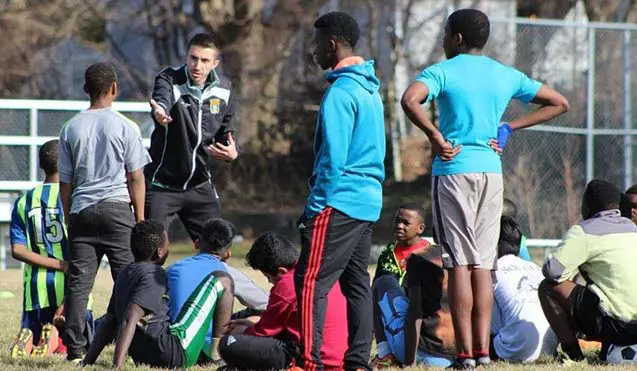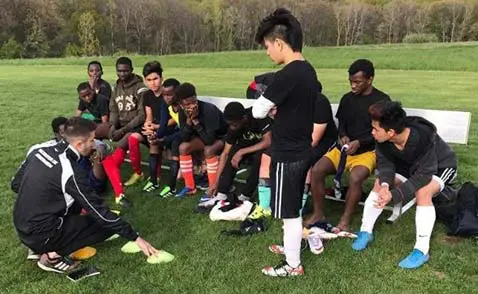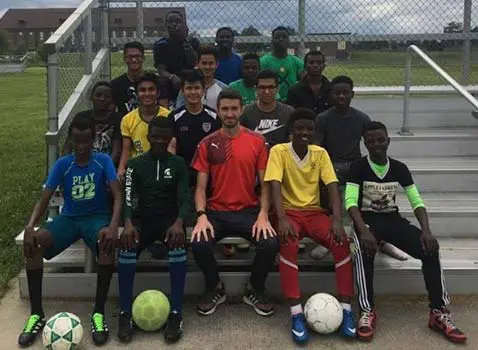RISE PERSPECTIVE
January 10, 2018
It's Time to Bridge Differences and Establish a Team Culture
By Lucas S. Capalbo

Time is defined in the dictionary as the indefinite continued progress of existence and events in the past, present and future. For some people, time is concrete; whereas for others, time is relative. I'll share with you the experience that taught me a lesson about time … well, maybe more than just time.
In 2017, I had the opportunity to coach soccer for diverse players from low-income families in mid-Michigan. We were a "salad bowl" of races, ethnic groups, religions and subcultures tossed in a team. Since we came from completely different upbringings, what would time mean to each one of us? And if it meant different things, which interpretation of time should we follow? These were some questions that I began asking myself after our first friendly match.
With the match scheduled to begin at 8 p.m., I told the players to meet me at their high school at 7 p.m. to commute together to the field.
On game day about 4:30 p.m., the field manager called me to say there were some of my players on the field waiting for me. I was very surprised that they were already there because the kickoff was almost four hours later. I told them to go home and return later, but since they no longer had rides, they had to wait there until the match began.

About 6:50 p.m. I parked my car at the meeting point and only one player was waiting for me. Thirty minutes went by and no other player had yet arrived. Combining the three players already on the field plus the one with me, we didn't have enough players to start the match.
I started calling some players to see where they were. Some of them sounded really calm, as if they were early. Moments later, one by one, they started to arrive, and, once we had enough players and couldn't wait any longer, we departed.
Fortunately, we won that game; however, this experience taught me that perhaps more important than developing an effective style of play to win games, we also had to bridge our cultural differences and establish a team culture.
Coaches and program leaders should recognize that their players go through different experiences in their lives that shape who they are. I often see many coaches (including myself at times) establishing rules for their teams without collectively defining what they mean. As that experience exemplified, what meant to be on time for me, meant something different to my players.

In some cases, coaches assume that their players have the same understanding about certain concepts since they are from the same race, speak similarly (language, accent) or perhaps were raised in similar places. Let's be careful when making these assumptions as each person has a unique combination of characteristics that define who they are despite their appearances or the "labels" they carry (e.g. Latino, African-American, gay, lower-class, Muslim).
My advice to coaches is to go beyond simply establishing a list of rules (spoken or unspoken) for players to follow and to establish a team culture where players and coaches share common values and goals based on everyone's perspectives. A team culture includes more than understanding of what "being on time" means to everyone; it also may account for teaching principles and values critical for young people's development. In my case my efforts to establish my team's culture hinged on:
- Teaching players to understand different points-of-view.
- Educating them to not judge others based on stereotypes.
- Guiding players to value one another.
- Motivating players to respectfully greet their teammates, coaches, game officials, opponents and everyone involved regardless of their differences.
- Creating a dress code for training sessions and game days that respected everyone's culture and religion.
- Recognizing that different players may have a different understanding of the game based on how they were previously coached.

Sport is a wonderful platform that allows coaches to develop tolerance, perspective taking and respect. Developing a team culture that is inclusive and recognizes and appreciates differences ultimately makes teams better. In a society in which so much division is taking place along the lines of race, ethnicity and nationality, coaches can use their influence to teach their athletes the values they need to be successful later on in their lives.
Some tips I will leave you with in establishing a team culture and developing your players into respectful young people are:
- Be proactive and address elements of the team culture from day one or as soon as you identify a new element to be added to it. Don't be afraid to discuss issues of race, diversity or other sensitive topics.
- Practice what you preach and the players will follow your example. I believe that youngsters learn more from watching us than from what we tell them. Also, reinforce the team culture consistently by publicly recognizing those who show a good example.
- Help players see that compromising for a common goal and respecting differences and the values you built together can be carried over to other contexts in their lives, such as their school, home and community.
Lucas S. Capalbo of São Paulo, Brazil, is a Ph.D. student in psychosocial aspects of sports at Michigan State University in East Lansing. He has worked, studied and coached soccer in more than 10 countries. His vast exposure to different cultures has influenced his work as a coach and scholar. He investigates strategies to empower coaches to promote positive youth development and peace through sports, which he believes is a great platform for social change.
Our
Partners
Stay
In Touch
Follow us on social media.